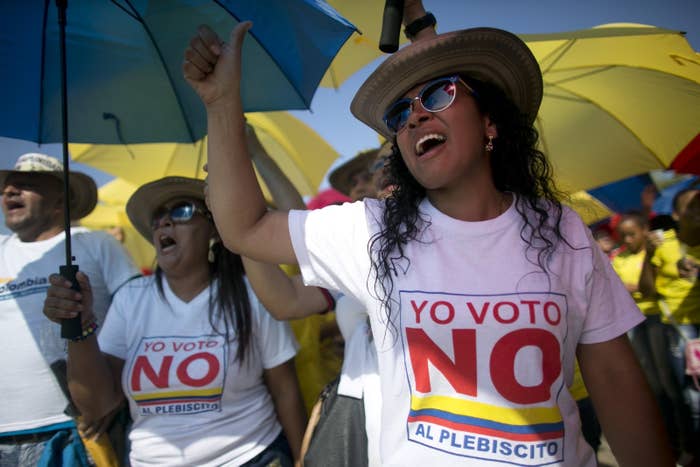
Mexico City, MEXICO — Shock and uncertainty descended on Colombia on Sunday evening as a referendum on a peace deal that would have ended the country’s five decade-long war with the largest rebel group came up short of the majority approval it needed.
All major polls conducted days before the referendum gave a vote in favor of the peace deal a landslide victory. One, undertaken by Datexco, revealed a Yes vote lead of nearly 20 points and a turnout of 67.1%. Yet, the deal was shot down by less than 0.5%, or 53,894 votes. Less than 40% of the country’s eligible voters turned out to their polling stations.
Part of the reason why the forecasts were so far off from the final results is because people were reluctant to respond honestly when asked about their opinions, analysts said.
“There was stigmatization and even public embarrassment in revealing a ‘No’ vote,” said Jorge Restrepo, director of the Conflict Analysis Resource Center, a Bogota-based think tank. “Saying no to the peace deal was viewed as a vote in favor of war,” he added.
Another factor, experts say, was that a hurricane hit the country’s Caribbean coast, which had a strong base in favor of the peace deal, deterring voters from heading to the polls.
Decades of armed confrontations, bombings, widespread kidnappings and systematic rapes, among other crimes, have put a burden on the country’s collective psyche. More than 220,000 people have been killed and nearly seven million have been displaced since the Revolutionary Armed Forces of Colombia, or FARC, were born in the country’s western mountain region.
Several peace talks between the state and the FARC over the years have unravelled, leading to new escalations of violence. The latest negotiation, which began in 2012 and was presided over by Cuba and Norway, culminated in a “definitive” bilateral cease-fire and fanfare-filled peace deal signing last month.
But critics of the deal said it allowed FARC members to get watered down sentences, including, in some cases, no prison time at all. According to the agreement, special tribunals would be set-up in which fighters could confess to their crimes, even serious ones: those who did so in a timely manner would be ordered to participate in infrastructure-building projects, help in the search for people who disappeared during the war, and have their freedom “restricted” for 5 to 8 years.
Former FARC members would also automatically get 10 seats in Congress for eight years.
“We want peace, but peace without impunity,” said former president Álvaro Uribe, the most outspoken critic of the peace deal.
Shortly after the final results were announced, President Juan Manuel Santos declared that the cease-fire remained intact and FARC top commander, Rodrigo Londoño, known as “Timochenko,” said that the fight for peace was not yet lost.
Nearly twenty-four hours after the results were announced, it remains unclear what the government will do. Santos convened a meeting with the opposition to determine the next steps. Henry Acosta, the mediator between the government and FARC, said to Blu Radio that negotiations must now include representatives from Uribe’s political party. Uribe has expressed the will to participate in future negotiations.
Parts of the deal can be implemented through laws passed in Congress, such as an amnesty for former FARC members, but the process will be lengthy and incomplete, and lacks key political support.
John Kirby, the State Department spokesperson, said in a statement Monday that “Difficult decisions are going to have to be taken in the days ahead,” and reiterated the support of the US, which has backed the negotiations.
While many in the country expressed sadness and embarrassment at the deal’s veto, others saw it as an opportunity. Political analyst José Manuel Acevedo argued that the agreement can now be modified to include a larger selection of voices.
“Let the moderates speak,” wrote Acevedo in a column in Semana magazine, “and those with polarizing messages during times of unity who want to scare away an authentic reconciliation in Colombia hide!”
